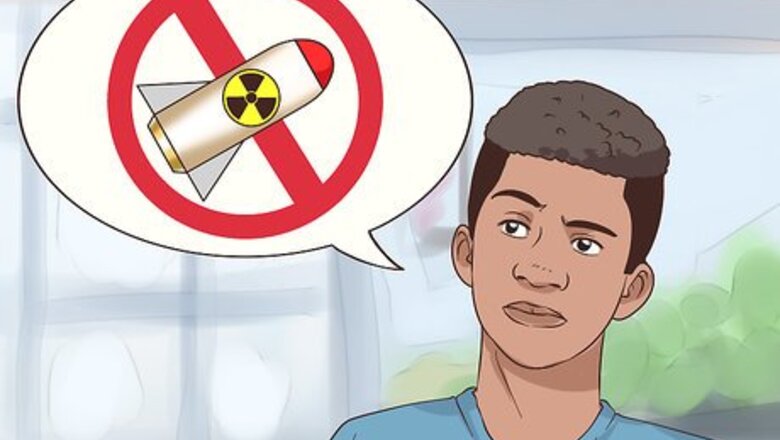
views
Putting Your Fear of Nuclear War in Perspective
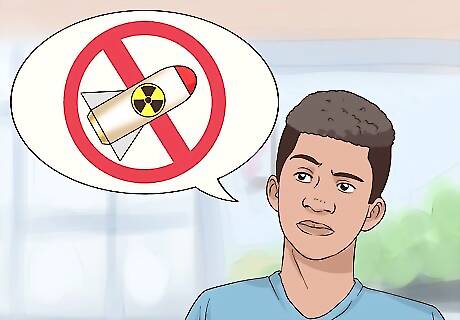
Acknowledge that while nuclear war could happen, it isn't likely. It can be tempting to take the bluster of world leaders seriously, but what sound like threats of war are more likely to be attempts at intimidation. Remind yourself that, while threats of nuclear war may be politically beneficial to authoritarian leaders, actual nuclear war would not benefit any existing government. Any party who started a nuclear war would attract censure from their own people and the international community. Understand that the parties in power do not want nuclear war. Have faith that even in governments controlled by autocrats, there are many, many people working to prevent large acts of destruction.
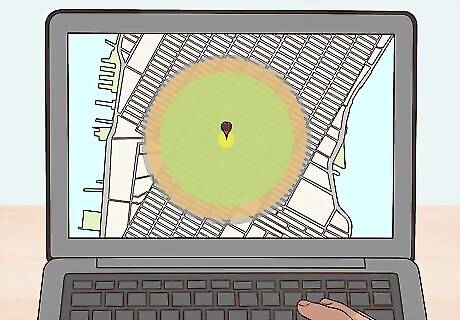
Understand that the power of nuclear warheads is routinely exaggerated. Popular culture is full of images of widespread destruction from the blast of a nuclear weapon, but the actual blast radius of a nuclear warhead is only a few miles or kilometers. The destructive blast, as well as the resulting fallout, are limited to the area around the strike. Even if nuclear warheads were to strike your country, the damage would be limited to the area of the strike. There is not nearly enough nuclear power to destroy life on earth. The blast of nuclear weapons is not nearly as powerful as that of natural forces like hurricanes or earthquakes. The threat of "nuclear winter" is incredibly low: it would take hundreds of simultaneous detonations to block the sun, and the area affected would be limited.

Put your fears in historical context. Remember that since the advent of nuclear power people have lived with the fear of nuclear war. Fear of an apocalypse goes even further back than that. Remind yourself that fear of losing what you have is something humans have struggled with throughout history. It may be helpful to look back on art from other moments in which people feared the end of the world. Listen to songs like Sun Ra's "Nuclear War," and remember that Sun Ra died without ever witnessing nuclear war. Read work such as "A Song on the End of the World" by Czeslaw Milosz.
Getting Help with Your Anxiety
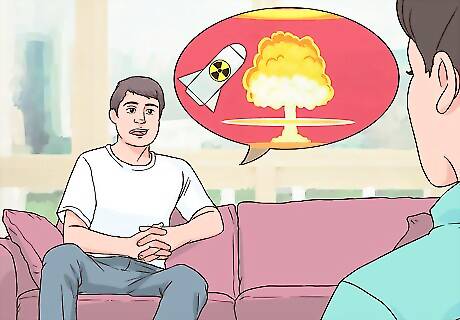
Talk to a therapist about cognitive behavioral therapy. Cognitive behavioral therapy can help you manage your anxiety. You'll learn to recognize and challenge anxious thoughts. Cognitive behavioral therapy can help you become more mindful of the fears and the ways they affect your thinking and decision-making. Cognitive behavioral therapy can help you take a more realistic view of the threat of nuclear war. If you don't have a therapist, look at your insurance company website to find a therapist within your network. Many therapists charge sliding-scale fees for clients whose insurance does not cover therapy. Ask your primary care physician for advice finding a counselor.
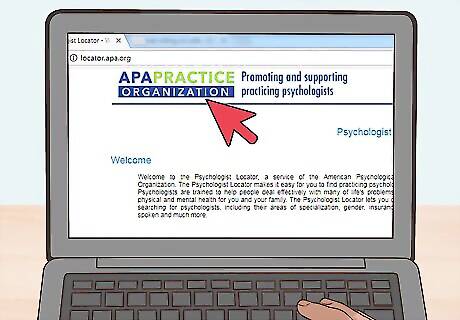
Seek exposure therapy. While there's no way to expose yourself to nuclear war, an expert on exposure therapy can help you gradually confront the situations you avoid out of fear. For instance, if your fear of nuclear war is preventing you from going outside, reading the newspaper, or traveling, your counselor can help you come up with steps to gradually return to doing these things. Exposure therapy can also help you confront thoughts that frighten you. With the guidance of an expert, you can think through fears that you have repressed. By reframing your fears and creating a new association through exposure or repainting a past trauma, you can shift that to have a different outcome. Results can happen slowly, but they can also happen pretty quickly, depending on the type of exposure therapy. If you are in the United States, you can use the APA locator to find a psychologist who specializes in anxiety disorders: http://locator.apa.org/

Consider taking medication. If anxiety is taking over your life, it may benefit you to consider taking mood-stabilizing medication. Talk to your doctor about short term medical treatments, like benzodiazepines or ketamine infusions, and long term prescriptions such as SSRIs.

Share your fears with others. Hiding your fears can lead to isolation, obsession, and despair. Talk to people you love and trust. Choose friends and family who are calm and not prone to anxiety. If you're having an episode of anxiety, tell someone. Don't isolate yourself.
Living with Anxiety about Nuclear War
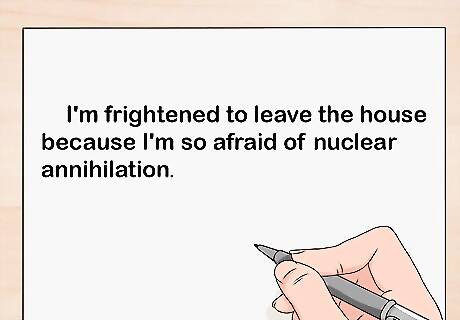
Write down your fears. Putting your fear in words can help you let go of certain anxieties, identify distorted thoughts, and reason with yourself. Take 20 minutes a day to write down your thoughts in a diary. Say how worried you feel, and what prompted the worry. Reread what you wrote and respond to anything that seems illogical. For instance, if you notice that you wrote, "I'm frightened to leave the house because I'm so afraid of nuclear annihilation, and I just want to stay inside and listen to the radio," you can then challenge that thinking by writing "I can't control what happens to the world by listening to the radio. I can only control my own day." Write down any positive thoughts or resolutions you come up with. For instance, you might write, "I will go outside every day, even if it's just to walk around my block."
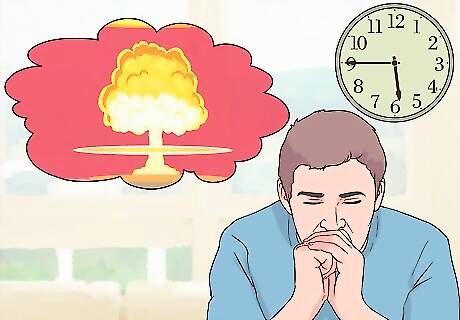
Schedule worry time. If your worries are getting in the way of your thinking about other things, try scheduling a 15-30 minute period of worry time in your day. Then when thoughts of war invade your mind, say to yourself, "I can't think about this now. I'll think about this at 5:45pm." Make sure to follow through! Sit and have your worries for the allotted time. When you're done, let them go.
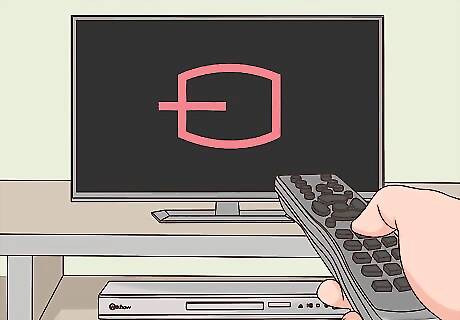
Limit your exposure to news media. While it's great to stay informed, too much media can inflame your anxieties. Control the ways that the news reaches you. Consider reading the news only once a day, once a week, or not at all if it's really wrecking your mood. Instead, expose yourself to positive news and limit your media exposure to uplifting and/or comedic movies and TV shows. If a lot of your news comes to you through social media, consider disconnecting from social media. Disable automatic news alerts on your phone and computer.
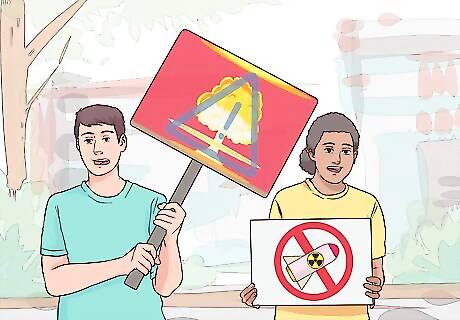
Get involved in nuclear disarmament efforts. Instead of letting fear paralyze you, take a proactive approach. Get involved in anti-war and pro-disarmament efforts. Write letters to your representatives. Get involved with organizations that work against war. Vote for experienced candidates who are skilled at international diplomacy. Join marches and attend letter-writing parties. The company of other people who share your concerns can be comforting. This only works with people who, like you, are attempting to balance their fears and move forward with their lives. Don't spend time with people who make you feel anxious and paranoid.
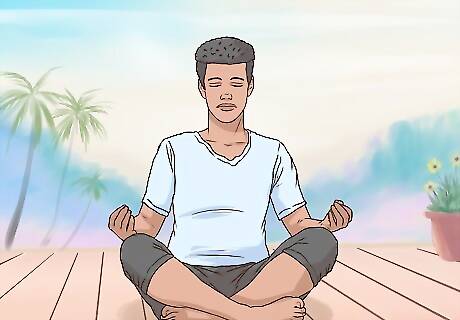
Practice mindfulness. Mindfulness is the practice of slowing your thinking so you can live in the moment. Being mindful helps you let go of fears of the future. It centers you in the present, and in your own body. Your body is an anchor that you can return to for stability when you are feeling fearful. To start, check in with your 5 senses. Notice what you are seeing, touching, smelling, tasting, and hearing. Breathe in and out slowly. Notice how it feels to inhale and exhale. Feel the ways your body reacts to your breath. Starting with your toes and moving up the body, slowly tense and relax your muscles. Only think about your muscles as you do this. If you're having a very anxious moment, try wiggling your toes.
Acknowledge that your fears may be more internal than external. Your fears about nuclear war may signify deeper underlying fears that you may have that aren’t really related to nuclear war at all. If nuclear war becomes a real concern for you, then it may help to reflect on other areas of your life where you overestimate or over exaggerate threats. This may help you to become aware of and correct your irrational thinking patterns. If you find yourself worried about large-scale events that you have no control over, then it may be helpful to think about whether there are other areas of your life that you feel the need to control. Acknowledge this and practice letting go of what you can’t control. Neurobiological sensitivity can cause you to feel overly sensitive and perceive danger more often than others. Becoming aware of your specific tendencies is an important part of learning how to deal with your fears in healthier ways.

Enjoy every day. There's no need to let fear of the future ruin the present. Incorporate pleasure into your routine. Engage in activities that are meaningful to you, such as creative work or spiritual practices. Get out in the sun when the weather is good. Make your living space tidy and pleasant to be in. Spend time with people you love, and pay attention to them. Schedule some "me time" every day during which you just pay attention to yourself. Enjoy your meals. Eat food you like, and pay attention to every bite. Read books and magazines to relax. Focusing on something really absorbing can relieve your fears and expand your thinking.




















Comments
0 comment